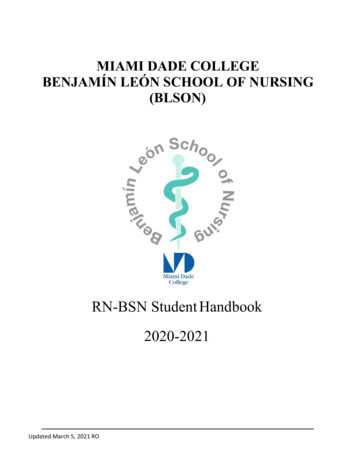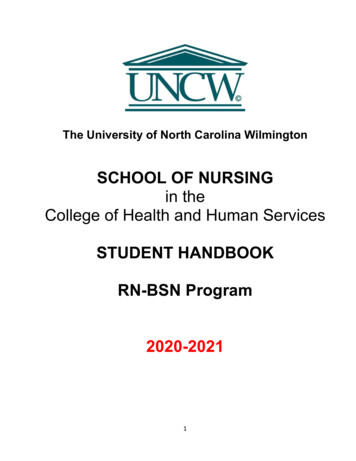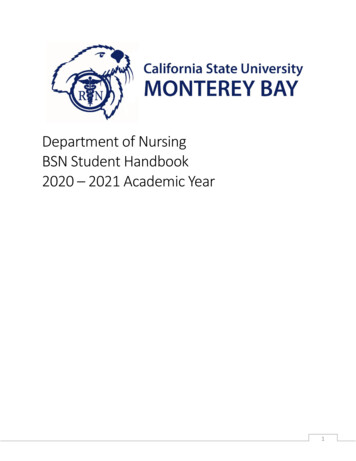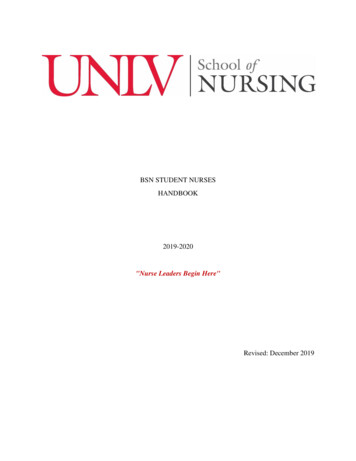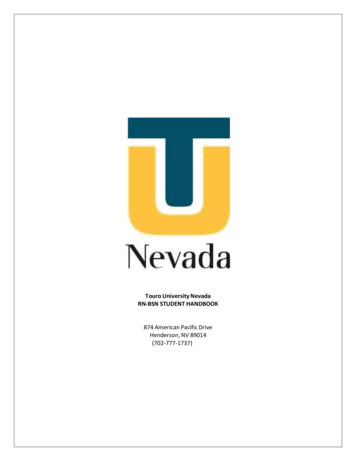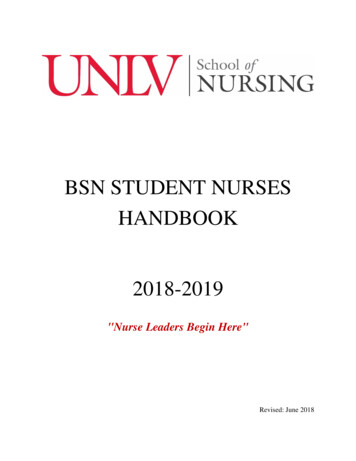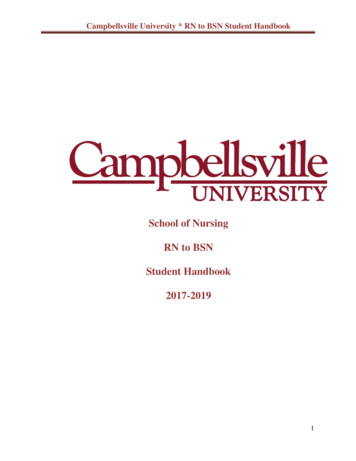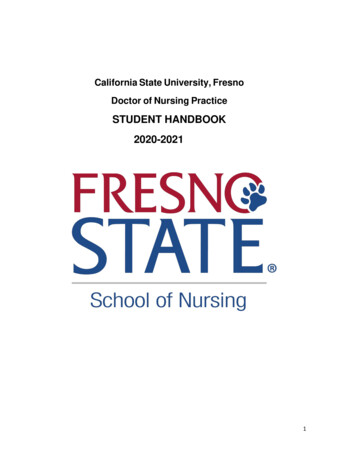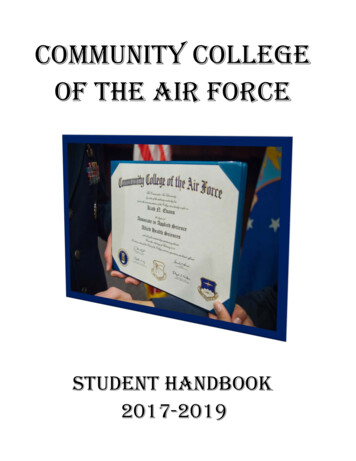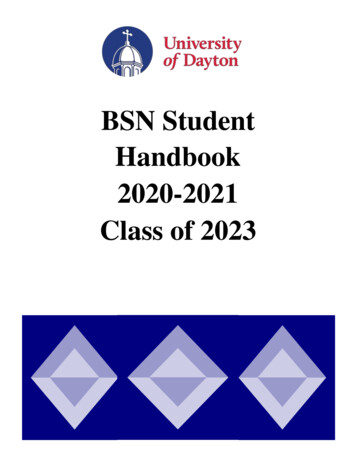
Transcription
BSN StudentHandbook2020-2021Class of 2023
University of Dayton BSN Pathway ProgramWelcome to the University of Dayton (UD) and to nursing. The UD BSN pathway program is aunique, highly competitive and challenging program. Another term for the pathway program isthe 1 2 1 program. You will competitively apply for direct entry as a UD freshman. As a directentry freshman, you are a nursing student. Upon successful completion of the fall, spring andsummer freshman courses, you will begin attending the Sinclair Community College (SCC)associate degree in nursing program.This unique model combines an excellent UD liberal arts curriculum with a top-quality RNpreparation program at SCC. You are a UD student during your first year, while attendingnursing at SCC and your final senior year back at UD. You are concurrently attend UD and SCCduring year two and three.Upon successful completion of your associate degree at SCC, you will be eligible to sit for yourNCLEX-RN exam the summer before your senior year. After successfully passing the NCLEXRN board exam, you can return to UD full time to complete your bachelor of science in nursing(BSN) degree.Upon completion of the University of Dayton BSN program, you willhave met the following UD Institutional Learning Goals:1. Scholarship: All undergraduates will develop and demonstrate advanced habits of academicinquiry and creativity through the production of a body of artistic, scholarly or community-basedwork intended for public presentation and defense.2. Faith traditions: All undergraduates will develop and demonstrate ability to engage inintellectually informed, appreciative and critical inquiry regarding major faith traditions.Students will be familiar with the basic theological understandings and central texts that shapeCatholic beliefs and teachings, practices and spiritualities. Students’ abilities should bedeveloped sufficiently to allow them to examine deeply their own faith commitments and also toparticipate intelligently and respectfully in dialogue with other traditions.
3. Diversity: All undergraduates will develop and demonstrate intellectually informed,appreciative and critical understanding of the cultures, histories, times and places of multipleothers, as marked by class, race, gender, ethnicity, religion, nationality, sexual orientation andother manifestations of difference. Students’ understanding will reflect scholarly inquiry,experiential immersion and disciplined reflection.4. Community: All undergraduates will develop and demonstrate understanding of and practicein the values and skills necessary for learning, living and working in communities of support andchallenge. These values and skills include accepting difference, resolving conflicts peacefullyand promoting reconciliation; they encompass productive, discerning, creative and respectfulcollaboration with persons from diverse backgrounds and perspectives for the common purposeof learning, service and leadership that aim at just social transformation. Students willdemonstrate these values and skills on campus and in the Dayton region as part of theirpreparation for global citizenship.5. Practical wisdom: All undergraduates will develop and demonstrate practical wisdom inaddressing real human problems and deep human needs, drawing upon advanced knowledge,values and skills in their chosen profession or major course of study. Starting with a conceptionof human flourishing, students will be able to define and diagnose symptoms, relationships andproblems clearly and intelligently, construct and evaluate possible solutions, thoughtfully selectand implement solutions, and critically reflect on the process in light of actual consequences.6. Critical evaluation of our times: Through multidisciplinary study, all undergraduates willdevelop and demonstrate habits of inquiry and reflection, informed by familiarity with CatholicSocial Teaching, that equip them to evaluate critically and imaginatively the ethical, historical,social, political, technological, economic and ecological challenges of their times in light of thepast.7. Vocation: Using appropriate scholarly and communal resources, all undergraduates willdevelop and demonstrate ability to articulate reflectively the purposes of their life and proposedwork through the language of vocation. In collaboration with the university community,students’ developing vocational plans will exhibit appreciation of the fullness of human life,including its intellectual, ethical, spiritual, aesthetic, social, emotional and bodily dimensions,and will examine both the interdependence of self and community and the responsibility to livein service of others.Additionally, upon successful completion of the BSN degree you willhave met the following the UD BSN Program Learning Outcomes:1. Apply critical thinking skills to leadership roles in order to improve patient safety andquality of care by utilizing interdisciplinary communication skills.
2. Use clinical reasoning to enhance nursing practice by understanding appropriateapplication and dissemination of Evidence-Based research and practice.3. Evaluate policies related to healthcare in terms of finance, regulations, andcommunity/public health through the use of professional competence and values.4. Choose appropriate communication styles and venues that will enhance interdisciplinarycollaboration and patient-centered care incorporating the principles surroundingorganizational environments and management.5. Demonstrate customer service to stakeholders within the nursing profession throughprofessional competence and ethical behaviors.6. Combine skills learned regarding evidence-based practice, information literacy, research,and healthcare informatics to advocate for and provide quality care to multiple patientpopulations across the lifespan.The UD BSN curriculum offers each student learning opportunities across courses to meet theUD Institutional Learning Goals and BSN Program Learning Outcomes.UD Mission StatementOur mission is simple, yet profound.The University of Dayton is a top-tier Catholic research university with academic offerings fromthe undergraduate to the doctoral levels. We are a diverse community committed, in theMarianist tradition, to educating the whole person and linking learning and scholarship withleadership and service.We are committed to the Marianist tradition of education that includes: educating the whole person through a learning community of challenge and support;connecting learning to leadership and service; andcollaborating for adaptation and changeMission and Vision for the UD BSN Program:The mission of the University of Dayton’s nursing program is to prepare students to practice asBaccalaureate generalist nurses through a rigorous and transformative liberal arts and sciencescurriculum in concert with nursing courses that are in alignment with the American Associationof Colleges of Nursing Essentials for Baccalaureate Education for Professional Nursing Practice.
The nursing mission is congruent with UD’s mission and commitment to the Marianist traditionto prepare nurses who will learn, lead, and serve the common good.UD Diversity and Guiding PrinciplesDriven by our Catholic and Marianist traditions, the University of Dayton will be known for itsresolute commitment to social justice, a high degree of cultural intelligence, interculturalcompetency, its awareness of different identities and their significance to higher education. We believe diversity, equity, and inclusion are fundamental to the University of Daytonfulfilling its Catholic and Marianist mission and institutional excellence.We will provide leadership in achieving a more robust integrated approach to diversity,equity and inclusion that:o builds on existing efforts across campus;o operates in a strategic, evidenced-based and data-driven manner; ando underscores the importance of comprehensive outcomes assessments and strongaccountability measuresWe will focus on efforts that innovate and transform institutional culture that result in thesustained celebration of diversity, modeling of inclusion, and achievement of equitableoutcomes across multiple identities.Ethical Conduct and Academic HonestyIt is an expectation that nursing students follow the University of Dayton standards of behaviorand code of conduct, academic honor code and commitment to community. Refer to the UDstudent handbook and key concepts and notices athttps://udayton.edu/studev/dean/student handbook.phpUD BSN Admission, Progression & Graduation:Purpose: To communicate admission requirements in addition to student expectations forprogram progression and graduation.Admission Policy: The UD BSN program is a direct admit program. Students admitted tonursing begin the nursing program their first year. The minimum requirements for considerationfor admission to this highly competitive program are:1. High School GPA of 3.0 or greater2. ACT of 24/SAT 1160*3. Essay, minimum of 250 words describing what motivated you to want tobecome a nurse. Include aspects of inspiration, volunteering, and/or workexperience.4. All applicants and matriculating students must meet essential abilitiesoutlined in the Sinclair Community College (SCC) nursing student
handbook. Ability to manage the stress and rigor of the nursing profession. Respond and react immediately to verbal instructions/requests. Demonstrate effective oral communication. Perform close and distance visual activities involving objects,persons, and paperwork, as well as discriminate depth and colorperception. Respond and react immediately to auditory signals frommonitoring equipment. Perform auditory auscultation without impediment. Discriminate between sharp/dull and hot/cold when usinghands. Work in a standing position. Frequent walking. Lift and transfer patients up to six inches (6") from a stoopedposition, then push or pull the weight up to three feet (3'). Lift and transfer patients from a stooped to an upright positionto accomplish bed-to-chair and chair-to-bed transfers. Physically apply up to ten pounds (10#) of pressure.*Applicants that do not meet the ACT/SAT requirement can take the Test of EssentialAcademic Skills (TEAS). Students must receive a proficient rating or higher in each area of theexam (Reading 69%, Math 63%, Science 45% and English 60%) to be eligible for the BSN(1 2 1) nursing program.Progression Policy:1. Students must complete and pass all freshman courses to progress to the second year atSCC. Students must maintain a 3.0 cumulative GPA and earn a grade of C or higher inNursing, Science, and Math courses to progress (HSS 197, BIO 151, CHM 123, MTH207, HSS 305, HSS 307). Exceptions are at the discretion of the nursing programdirector.2. Nursing assistant requirement: Prior to starting the Sinclair nursing courses (second fallsemester), students must complete a state approved nurse aide training program (STNA).Comparable work experience (nurse aide, patient care technician) may be consideredupon review of the position description/job responsibilities. Students must provide to thenursing office a copy of the letter, card, or certificate of course completion, or submittheir job description for consideration. Sinclair Community College offers STNA trainingthrough the Allied Health Department (ALH 1120). Contact the Nurse Aide TrainingProgram at 512-2484 for information. Students will not progress to second year (at SCC)without such evidence.3. Withdrawal from the program any time during the first year will result in the studentcompetitively reapplying to the program.4. Students withdrawing from the SCC courses or program during year two and/or threeneed to follow the SCC program progression policy. See SCC nursing student handbook.
5. Students withdrawing from the fourth year at UD and wishing to return must speak withtheir UD nursing advisor and petition for reinstatement. Reinstatement is dependent uponnursing education council approval and space available.6. To continue program progression, students must maintain academic good standing. Goodstanding for the nursing program includes:a. Students must maintain a 3.0 UD GPA or higher for good standing. Grade of C orhigher in Nursing, Science, and Math courses to progress (BIO 151, CHM 123,MTH 207, HSS 197, HSS 305, HSS 307, NSG 401, NSG 402, NSG 404, NSG405, NSG 406, NSG 407, HHS 428, and NSG 408).b. If a student’s GPA falls below the required 3.0 the student will be placed onacademic probation the following semester. The student has two semesters toraise their GPA to the required 3.0. Dismissal from the program will result if theGPA remains below a 3.0 after two consecutive semesters of probation.c. Students must follow SCC policy for academic good standing while at SCC foryears two and three. See SCC student handbook.7. If a student receives below a grade of C in any required nursing, science or math coursethe course will have to be repeated (BIO 151, CHM 123, MTH 207, HSS 197, HSS 305,HSS 307, NSG 401, NSG 402, NSG 404, NSG 405, NSG 406, NSG 407, and NSG 408).a. Receiving a grade of C or lower could cause a student to become out of sequenceand graduate later than anticipated.b. Students can repeat a nursing, science or math course once, if a student isunsuccessful in two nursing, science and/or math courses results in programdismissal (BIO 151, CHM 123, MTH 207, HSS 197, HSS 305, HSS 307, NSG401, NSG 402, NSG 404, NSG 405, NSG 406, NSG 407, HSS 428, and NSG408).8. If a student has to repeat a course, the student will be out of sequence (OOS) and maygraduate later than anticipated. It is the student’s responsibility to seek council with theUD Financial Aid office regarding changes to their financial aid award.9. A student that falls out of sequence, will follow the BSN Student Handbook applicable tothe cohort they resume BSN status with. Exceptions are at the discretion of the nursingprogram coordinator.10. A student must graduate from SCC and pass NCLEX to progress to the senior year.Graduation Policy: Students in the UD BSN program are responsible for meeting the requireddegree requirements. Students will receive academic advising from the Health and Sport Sciencedepartment, Nursing Program faculty advisors but students are accountable to comply with allpublished academic policies related to the BSN program.To be eligible for graduation from the BSN program, students must successfully complete aminimum overall number of specified credit hours required for the degree. Credits fromsuccessfully repeated courses count once toward the overall credit hours needed for the BSNdegree.1. BSN students complete a minimum of 124 credit hours of UD and SCC coursework. UDcoursework must be successfully completed with a grade of C or higher in didactic andpracticum/clinical courses.2. Achieve a UD cumulative grade point average of at least a 3.0 (B).
3. Complete all BSN degree requirements within six years of enrolling in the firstnursing/HSS course in the nursing major.4. Apply for graduation according to University of Dayton published deadlines.UD BSN- Change of Major to BSN:Purpose: To communicate change of major process from a current UD major to the BSNprogram.Change of Major Admission Policy: The minimum requirements for consideration for a changeof major to this highly competitive program are:5. ACT of 24/SAT 1160* (Cannot be older than two years by the time youenter Nursing at SCC).6. Current UD GPA of 3.0 or greater.7. Meet with Nursing program advisor to discuss nursing as a career.Review current UD transcript and discuss proposed BSN program plan.Note: A change of major from a current UD program to the BSNmajor could result in delay of previously scheduled graduation year.8. Make appointment with Financial Aid to review impact on UD financialaid award.9. After review of proposed BSN program plan and Financial Aid award ifstudent wants to pursue, they will file a change of major form (seeattached). Admission decisions are competitive and on a space-availablebasis.10. All applicants and matriculating students must meet essential abilitiesoutlined in the Sinclair Community College (SCC) nursing studenthandbook.11. Change of major approvals are granted by the nursing program directorand the HSS chair.*Applicants that do not meet the ACT/SAT requirement can take the Test of EssentialAcademic Skills (TEAS). Students must receive a proficient rating or higher in each area of theexam (Reading 69%, Math 63%, Science 45% and English 60%) to be eligible for the BSN(1 2 1) nursing program.
REQUEST FOR NURSING MAJORDepartment of Health and Sport ScienceUniversity of DaytonTo the Student:Change of major to the BSN is contingent upon student understanding of change of majoroutcomes and meeting all Bachelor of Science in Nursing requirements. As a student requestinga change of major to the BSN (please initial after each statement):1) I have reviewed and agree to the proposed BSN program plan.2) I understand that I may graduate later than my initial UD program plan indicated.3) I have met with UD Financial Aid and understand the revisions to my financial aid award.4) I attest that I meet BSN and SCC nursing student essential abilities (see nursing studenthandbook).5) I request to be considered for a change of major to the BSN program.Name PrintedID NumberSignatureDateDepartment of Health and Sport Science ActionChair’s SignatureDateProgram Coordinator’s Signature (When Required)Date
Program Academic Good StandingStudents must maintain a 3.0 UD GPA or higher for good standing. Grade of C or higher inNursing, Science, and Math courses to progress (BIO 151, CHM 123, MTH 207, HSS 197, HSS305, HSS 307, NSG 401, NSG 402, NSG 404, NSG 405, NSG 406, NSG 407, and NSG 408).Students must follow SCC policy for academic good standing while at SCC for year two andthree. See SCC student handbook.Course FailureIf a student receives below a grade of C in any required nursing, science or math course thecourse will have to be repeated (BIO 151, CHM 123, MTH 207, HSS 197, HSS 305, HSS 307,NSG 401, NSG 402, NSG 404, NSG 405, NSG 406, NSG 407, and NSG 408).Receiving a grade of C or lower could cause a student to become out of sequence and graduatelater than anticipated.Students can repeat a nursing, science or math course once, if a student is unsuccessful in twonursing, science and/or math courses results in program dismissal (BIO 151, CHM 123, MTH207, HSS 305, HSS 307, NSG 401, NSG 402, NSG 404, NSG 405, NSG 406, NSG 407, andNSG 408).Student SuccessReviewing and Reporting Student SuccessReview of student success occurs through semester reports, Student Success Network, andduring semester advising. The process and procedures for each of these mechanisms are below.1. Semester Reports (End of Semester Reporting)Policy: The BSN Director will review end of semester reports to identify low GPA grades of"C-" or below to monitor student success at the end of the semester.Procedure Student GPA and grade reports are run at the end of spring semester by HSSAdministrative staff Reports are provided to the BSN Director for review Any drop in GPA below a 3.0 or a grade of “C-“, "D" or "F" is reported to the nursingadviser assigned to the student. The adviser will schedule a meeting with the student and draft a remediation or retentionplan (see Remediation and Retention policy for procedures)
2. Student Success Network (Midterm Reporting)Student Success Network (SSN) is a University wide quick and simple way for instructors tonotify advisors and support offices when they have a concern about a student, enabling studentsto receive needed assistance in a timely and effective manner. Faculty complete two checkpointseach semester. Student Success Network is a Student Progress Checkpoint issued to allinstructors twice a semester. The first survey, which will arrive near the beginning of the term,asks instructors to verify that each student l
Nursing, Science, and Math courses to progress (HSS 197, BIO 151, CHM 123, MTH 207, HSS 305, HSS 307). Exceptions are at the discretion of the nursing program director. 2. Nursing assistant requirement: Prior to starting the Sinclair nursing courses (second fall semester), students must complete a state approved nurse aide training program (STNA).
